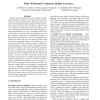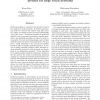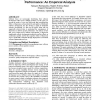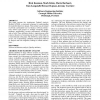304 search results - page 22 / 61 » Studying the Impact of Social Structures on Software Quality |
ICSE
2004
IEEE-ACM
14 years 7 months ago
2004
IEEE-ACM
Quality assurance (QA) tasks, such as testing, profiling, and performance evaluation, have historically been done in-house on developer-generated workloads and regression suites. ...
COMAD
2009
13 years 8 months ago
2009
Positional analysis is considered an important tool in the analysis of social networks. It involves partitioning of the set of actors into subsets such that actors in a subset are...
CSCW
2011
ACM
13 years 2 months ago
2011
ACM
Bug reporting/fixing is an important social part of the software development process. The bug-fixing process inherently has strong inter-personal dynamics at play, especially in h...
SIGSOFT
2007
ACM
14 years 8 months ago
2007
ACM
Software firms are increasingly distributing their software development effort across multiple locations. In this paper we present the results of a two year field study that inves...
ICECCS
1998
IEEE
13 years 11 months ago
1998
IEEE
This paper presents the Architecture Tradeoff Analysis Method (ATAM), a structured technique for understanding the tradeoffs inherent in design. This method was developed to provi...




